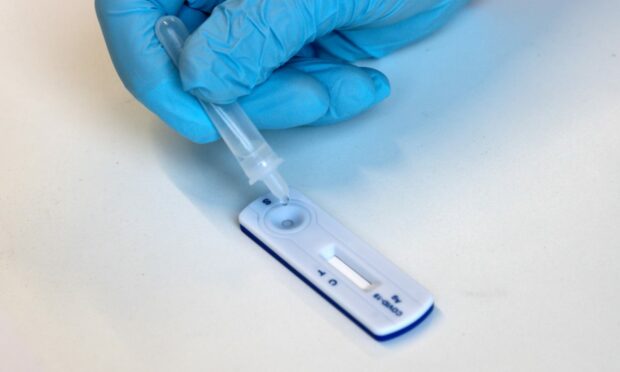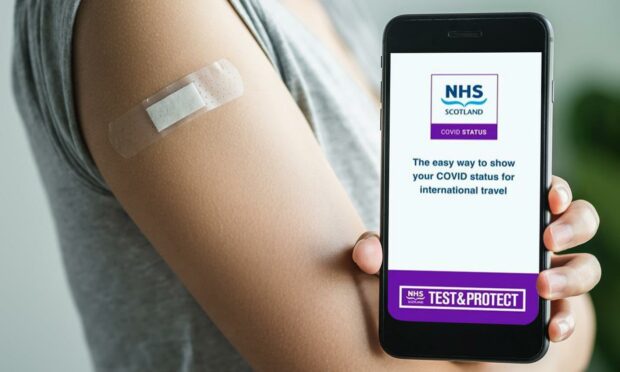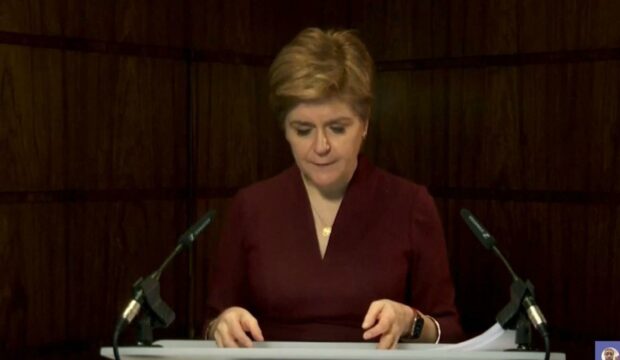Limits on numbers attending large gatherings will be removed from next week.
First Minister Nicola Sturgeon confirmed a phased lifting of some coronavirus restrictions will begin in the coming days.
The first restriction – the 500 person limit on outdoor gatherings – will be removed on Monday.
Phased removal
During an update to the Scottish Parliament on Tuesday, Ms Sturgeon said more restrictions will be lifted from January 24, however this is subject to review.
The newest wave of restrictions were implemented on Boxing Day in an effort to prevent the spread of the Omicron variant of the coronavirus, which is believed to be more transmissible than other mutations.
However, the decision has now been made to lift them after new data revealed that the rate of transmission may be slowing down.
The average number of daily cases in the last seven days has fallen 17% when compared to the previous week, and cases have now fallen across all age groups apart from over 85s.
Speaking at Holyrood on Tuesday, the First Minister said: “I will indicate that from next week we will begin to lift the measures introduced before Christmas – but
that we will do so in a phased and careful way, starting with the removal of attendance limits on live outdoor events from Monday.”
Omicron fails to reach worst-case scenario
The First Minister also said the Omicron variant’s failure to live up to the government’s worst expectations had contributed to the decision.
Last month, it was predicted that new infections could reach 50,000 a day.
However, this has failed to come true, with infections so far peaking at 30,000 a day.
Ms Sturgeon added: “it is very likely that the situation we face now, though serious, would have been even more challenging without the renewed sacrifices made by people across the country over these last few weeks.
“Further, while we need to be cautious in our interpretation of the daily case numbers at this stage – for reasons I will set out – we can see from those and also from hospital data, some early indications that the situation might be starting to improve.”
Changes to meaning of ‘fully vaccinated’
Changes to what it means to be fully vaccinated were also announced on Tuesday, with new rules meaning some may need a booster to be considered fully protected.
The new guidance states that those who had their second dose of the vaccine more than four months ago will need to have a booster shot in order to be considered fully vaccinated.
From Thursday, changes to the NHS passport app will mean that the QR codes will include information on booster doses.
Plea for visiting limits and vaccinations
Despite the good news about Omicron, the First Minister reiterated her plea for the unvaccinated to get their jabs.
During her speech to the Scottish Parliament, she said that those who are eligible for the vaccine but have not accepted it are putting themselves and others at “unnecessary risk”.
She added: “The latest available data, adjusted for age, suggests that someone not fully vaccinated is at least four times more likely to require hospital treatment than someone who has had a booster or third dose.
“So whatever age you are, getting boosted is the single most important thing you can do to protect yourself from the worst impacts of Covid, and to reduce pressure on the NHS.”
Ms Sturgeon also asked that Scots continue limiting their social interaction, saying: “The advice to the general public to try to limit contact with people in other households, and in particular to limit the number of households in any indoor gathering to a maximum of three.
“We are not advising people to cut all social interaction. That simply isn’t practical, and has a serious impact on mental health and wellbeing.
“But trying to limit social interactions remains a sensible step at this stage.
“It helps stem to some extent increases in transmission – and so has a collective benefit.”



